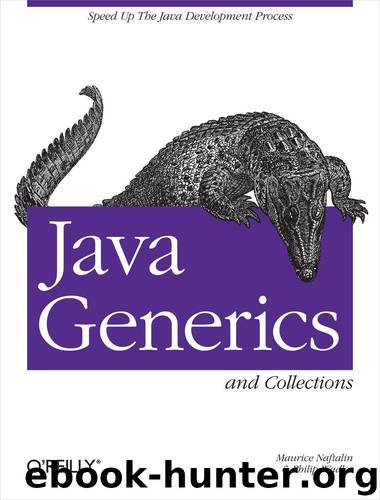Java Generics and Collections by Maurice Naftalin and Philip Wadler

Author:Maurice Naftalin and Philip Wadler
Language: eng
Format: mobi
Tags: COMPUTERS / Programming Languages / Java
ISBN: 9780596102654
Publisher: O’Reilly Media
Published: 2009-02-08T16:00:00+00:00
The concurrent collections have other strategies for handling concurrent modification, such as weakly consistent iterators. We discuss them in more detail in Collections and Thread Safety.
Implementations
We have looked briefly at the interfaces of the Collections Framework, which define the behavior that we can expect of each collection. But as we mentioned in the introduction to this chapter, there are several ways of implementing each of these interfaces. Why doesn’t the Framework just use the best implementation for each interface? That would certainly make life simpler — too simple, in fact, to be anything like life really is. If an implementation is a greyhound for some operations, Murphy’s Law tells us that it will be a tortoise for others. Because there is no “best” implementation of any of the interfaces, you have to make a tradeoff, judging which operations are used most frequently in your application and choosing the implementation that optimizes those operations.
The three main kinds of operations that most collection interfaces require are insertion and removal of elements by position, retrieval of elements by content, and iteration over the collection elements. The implementations provide many variations on these operations, but the main differences among them can be discussed in terms of how they carry out these three. In this section, we’ll briefly survey the four main structures used as the basis of the implementations and later, as we need them, we will look at each in more detail. The four structures are:
Arrays
These are the structures familiar from the Java language — and just about every other programming language since Fortran. Because arrays are implemented directly in hardware, they have the properties of random-access memory: very fast for accessing elements by position and for iterating over them, but slower for inserting and removing elements at arbitrary positions (because that may require adjusting the position of other elements). Arrays are used in the Collections Framework as the backing structure for ArrayList, CopyOnWriteArrayList, EnumSet and EnumMap, and for many of the Queue and Deque implementations. They also form an important part of the mechanism for implementing hash tables (discussed shortly).
Download
This site does not store any files on its server. We only index and link to content provided by other sites. Please contact the content providers to delete copyright contents if any and email us, we'll remove relevant links or contents immediately.
| Coding Theory | Localization |
| Logic | Object-Oriented Design |
| Performance Optimization | Quality Control |
| Reengineering | Robohelp |
| Software Development | Software Reuse |
| Structured Design | Testing |
| Tools | UML |
The Mikado Method by Ola Ellnestam Daniel Brolund(22431)
Hello! Python by Anthony Briggs(21622)
Secrets of the JavaScript Ninja by John Resig Bear Bibeault(20183)
Dependency Injection in .NET by Mark Seemann(19563)
The Well-Grounded Java Developer by Benjamin J. Evans Martijn Verburg(19309)
Kotlin in Action by Dmitry Jemerov(19233)
OCA Java SE 8 Programmer I Certification Guide by Mala Gupta(18772)
Algorithms of the Intelligent Web by Haralambos Marmanis;Dmitry Babenko(17575)
Adobe Camera Raw For Digital Photographers Only by Rob Sheppard(16963)
Grails in Action by Glen Smith Peter Ledbrook(16726)
Test-Driven iOS Development with Swift 4 by Dominik Hauser(10923)
Becoming a Dynamics 365 Finance and Supply Chain Solution Architect by Brent Dawson(8065)
Microservices with Go by Alexander Shuiskov(7829)
Practical Design Patterns for Java Developers by Miroslav Wengner(7731)
Test Automation Engineering Handbook by Manikandan Sambamurthy(7690)
Angular Projects - Third Edition by Aristeidis Bampakos(7176)
The Art of Crafting User Stories by The Art of Crafting User Stories(6622)
NetSuite for Consultants - Second Edition by Peter Ries(6545)
Demystifying Cryptography with OpenSSL 3.0 by Alexei Khlebnikov(6313)
